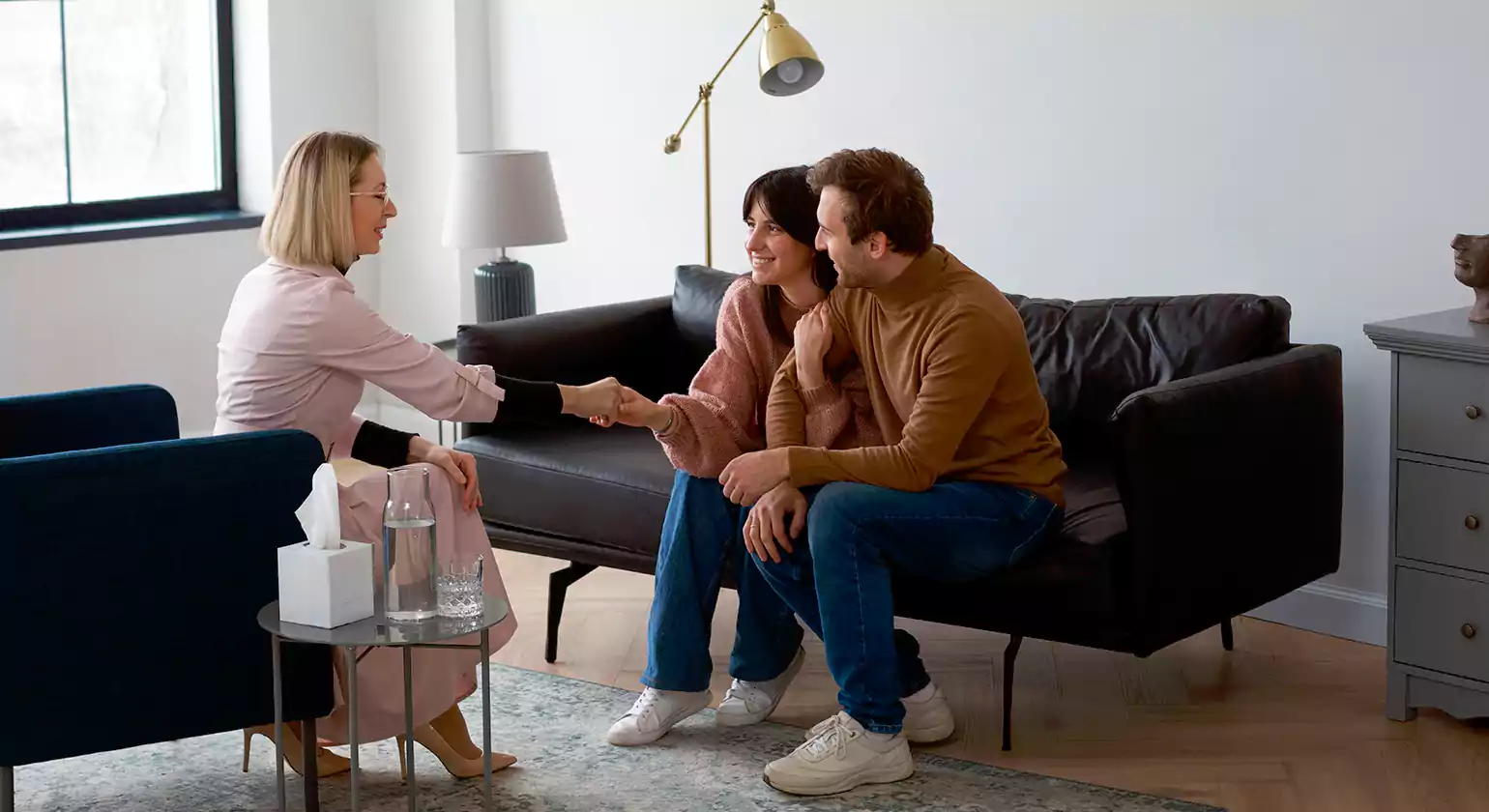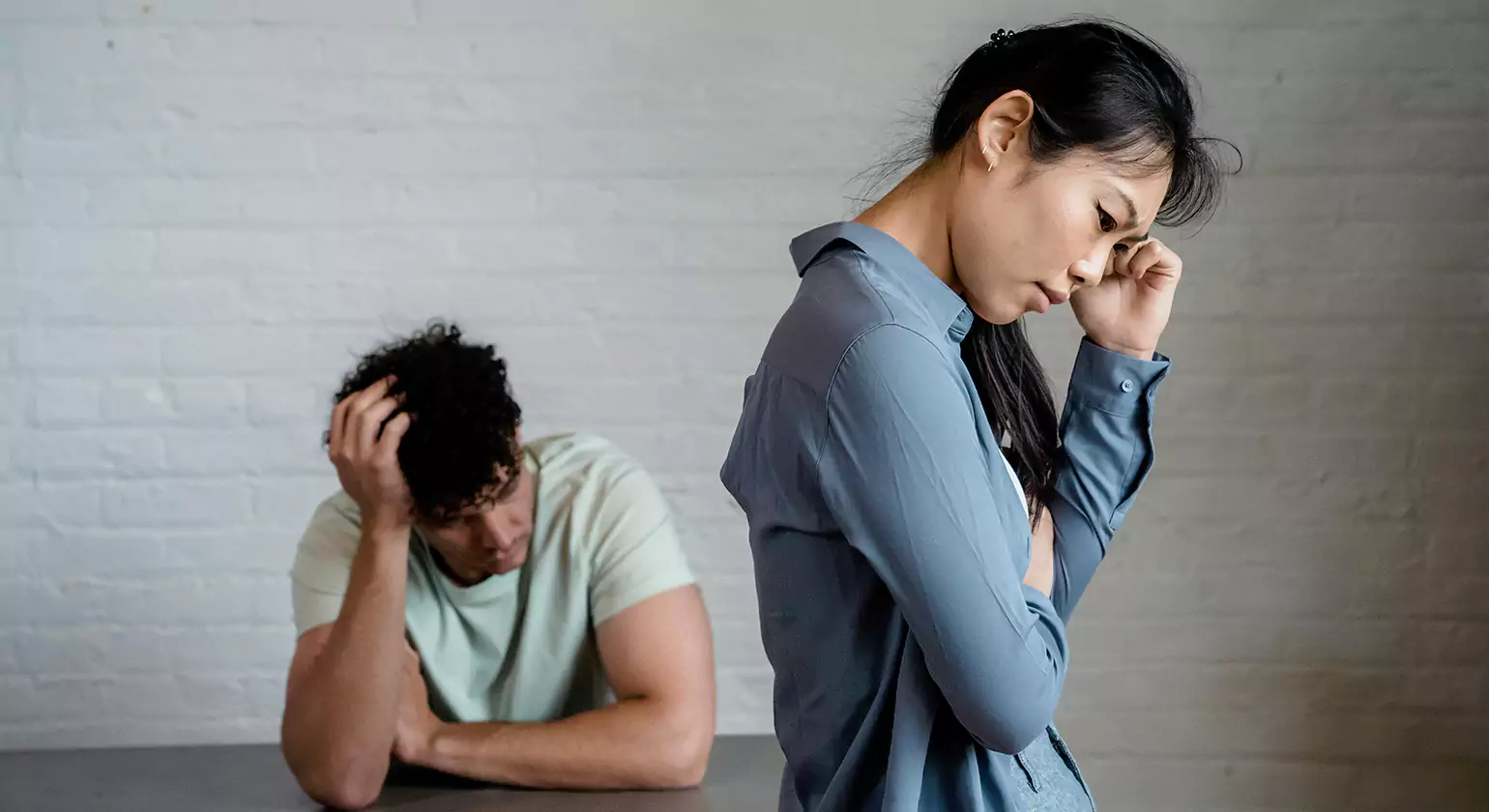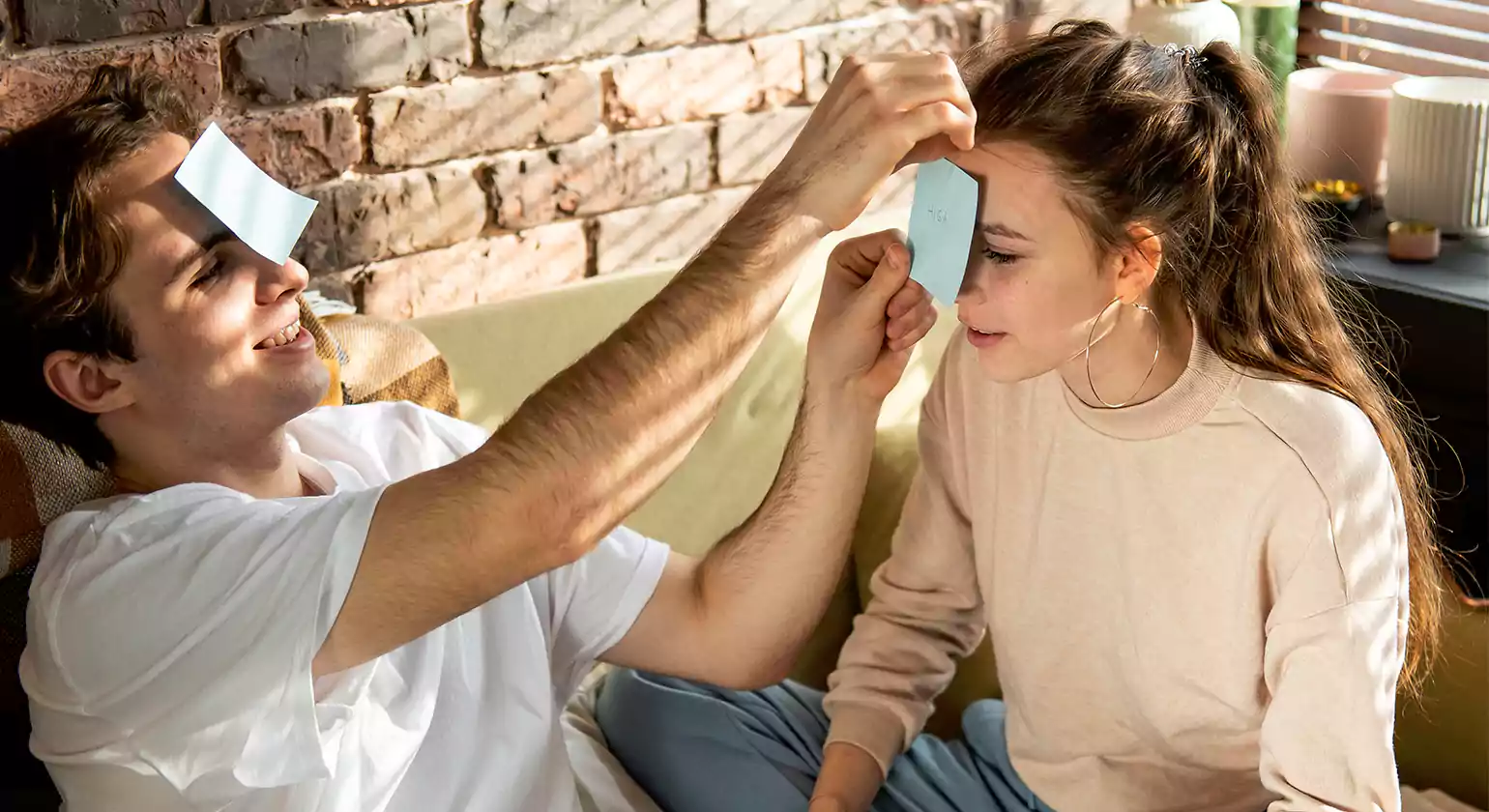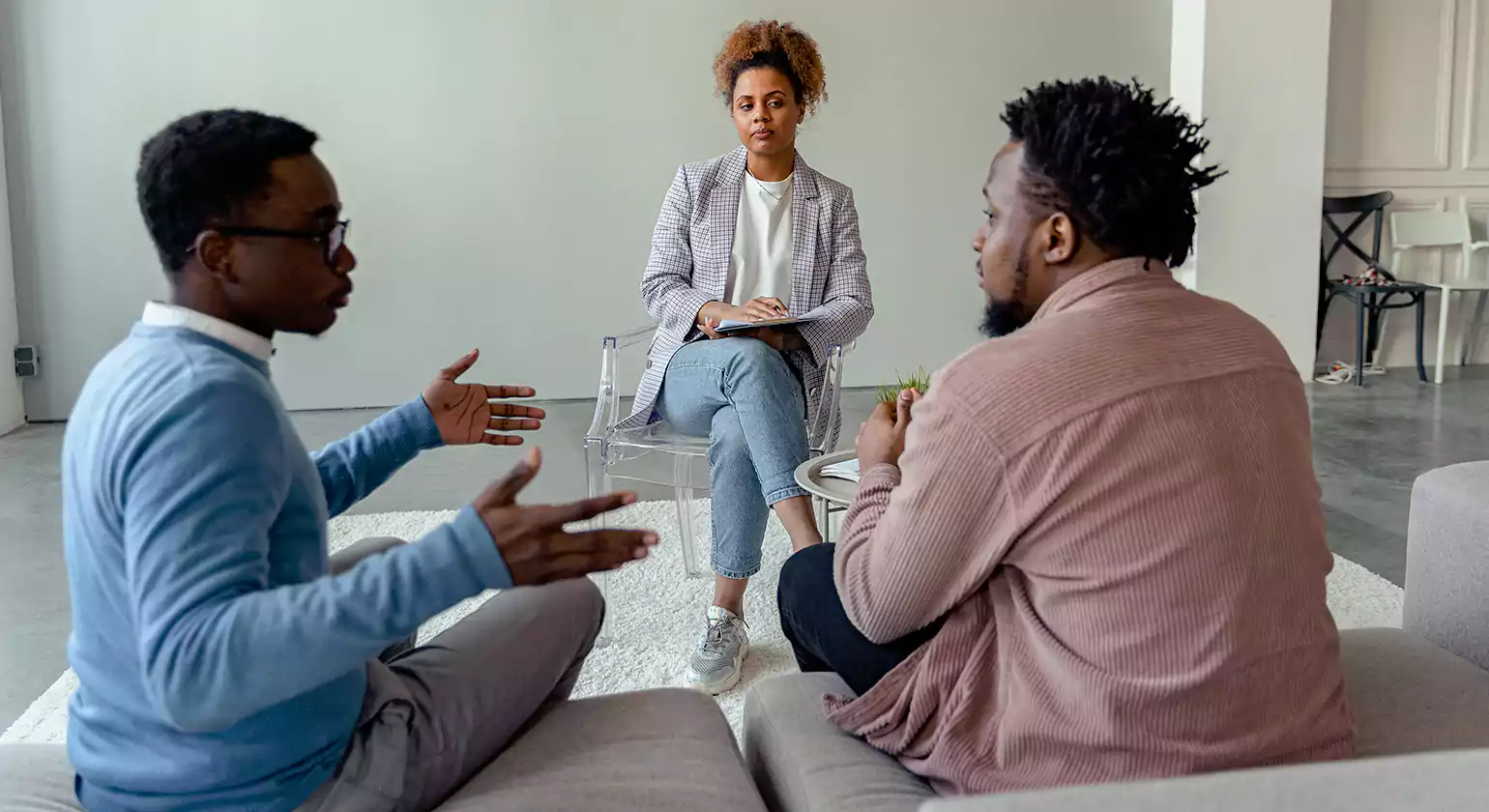Table of Contents
Introduction to Couples Therapy

What is Couples Therapy?
Couples therapy is a therapeutic process where couples work together with a trained therapist to address relationship issues. This can range from communication difficulties to infidelity, trust issues, or even questions about the future of the relationship. The primary goal is to help couples navigate their challenges in a supportive environment, improving emotional and relational dynamics.
How Does Couples Therapy Differ from Couples Counseling?
While often used interchangeably, the terms couples therapy and couples counseling can have different connotations. Couples counseling is typically seen as a short-term approach focused on resolving specific issues. In contrast, couples therapy may involve a deeper exploration of the relationship dynamics and underlying patterns over a longer duration, aiming for more profound personal and relational growth.
Reasons for Couples Therapy

Benefits of Going to Couples Therapy
Couples therapy can help partners rebuild their emotional connection, improve communication, and enhance overall relationship satisfaction. For many, therapy offers a safe space to express feelings and explore their relationship from a neutral perspective, which can lead to more productive conversations and healthier patterns.
Reasons to Seek Couples Counseling
Couples often seek counseling when they experience persistent conflicts that are difficult to resolve on their own. Common reasons include a lack of communication, growing emotional distance, unresolved arguments, trust issues, and changes in life circumstances, such as parenting or career stress.
Who Should Go to Couples Therapy?
Couples therapy is suitable for anyone facing relationship difficulties, whether married or not. It’s beneficial for partners who feel stuck or are struggling to find common ground. Therapy is also useful for those who want to strengthen their relationship proactively, even if there aren’t any specific problems.
When to Seek Couples Therapy

When to Go to Couples Therapy
It’s often helpful to seek therapy early, before problems become entrenched. If partners notice recurring patterns of conflict, loss of intimacy, or growing dissatisfaction, therapy can offer tools to address these challenges before they cause irreparable harm.
When is Couples Therapy Not Appropriate?
Couples therapy may not be appropriate if there is abuse, extreme dishonesty, or if one partner is unwilling to engage in the therapeutic process. In such cases, individual therapy or legal intervention may be needed first.
What to Expect in Couples Therapy

What Happens in Couples Therapy?
In couples therapy, the therapist guides the couple through discussions about their relationship, focusing on both individual and shared perspectives. Sessions may involve talking through past issues, learning conflict resolution strategies, or identifying patterns that contribute to problems. The therapist may also suggest activities or assignments between sessions to help partners practice new skills.
What to Talk About in Couples Therapy
The topics discussed can vary based on the couple’s concerns, but generally, couples address communication issues, trust, emotional connection, family dynamics, and future goals. Each session offers a chance for both partners to speak openly in a safe, neutral space.
How to Prepare for Couples Therapy
Preparing for couples therapy involves reflecting on your own feelings, behaviors, and goals for the relationship. It’s important to enter therapy with an open mind and a willingness to engage honestly. Couples should also set clear intentions, such as improving communication or resolving specific conflicts.
How Long Does Couples Therapy Last?
Couples therapy typically lasts anywhere from 6 to 12 sessions, depending on the nature of the issues being addressed. Some couples may see improvements in a few sessions, while others may benefit from a longer-term commitment.
Techniques and Approaches in Couples Therapy

What is Differentiation in Couples Therapy?
Differentiation is a key concept in many therapeutic approaches. It involves helping individuals in a relationship maintain their own identity while remaining connected to their partner. It encourages partners to recognize and respect each other’s differences, leading to healthier boundaries and more harmonious relationships.
Emotionally Focused Therapy (EFT) in Couples Counseling
EFT helps couples strengthen their emotional bond by identifying and changing negative emotional patterns. It encourages partners to express vulnerable feelings, improving communication and fostering a deeper connection.
Cognitive Behavioral Therapy (CBT) for Couples
CBT focuses on changing negative thought patterns and behaviors that impact relationships. It helps couples reframe thoughts, improve communication, and develop healthier conflict resolution skills.
The Gottman Method for Building Healthy Relationships
The Gottman Method emphasizes building trust, improving communication, and resolving conflicts constructively. It helps couples strengthen their friendship and deepen emotional connections through research-based exercises and strategies.
Effectiveness of Couples Therapy

Does Couples Therapy Work?
Yes, couples therapy can be highly effective, particularly when both partners are committed to making changes and improving their relationship. Research shows that a significant number of couples report better communication, increased intimacy, and greater satisfaction after therapy.
Can Couples Therapy Make Things Worse?
In some cases, couples may feel worse initially, especially if deep-seated issues are brought to the surface. However, with the right therapist and approach, these challenges often lead to greater understanding and healing. It’s important for couples to communicate their concerns with their therapist if they feel uncomfortable or overwhelmed.
Challenges in Couples Therapy

When Couples Therapy Becomes a Weapon
Unfortunately, therapy can sometimes be used as a means of manipulation or a way to “win” arguments. If one partner uses therapy to control or belittle the other, it undermines the potential for growth. A good therapist will work to ensure that therapy remains a collaborative process where both partners are respected and heard.
Overcoming Resistance to Couples Therapy
Resistance to couples therapy is common, especially when one or both partners are unsure about the process or fearful of confronting difficult issues. Some may resist because they feel therapy won’t help, or they fear being blamed. A skilled therapist works to create a safe, non-judgmental space where both partners feel comfortable sharing their concerns. By addressing fears and explaining the benefits of therapy, the therapist helps couples overcome resistance and begin the journey toward resolution and growth.
Dealing with Power Imbalances in Therapy
Power imbalances can hinder progress in couples therapy, particularly if one partner dominates or controls the conversation. This dynamic can cause one partner to feel unheard or invalidated, leading to frustration. A competent therapist is aware of these imbalances and ensures that both partners have an equal voice. The therapist may use techniques to ensure that each partner is given the opportunity to speak, validate their feelings, and work toward creating a more balanced and equitable relationship.
Managing Unrealistic Expectations in Couples Therapy
Couples often come into therapy with unrealistic expectations, believing that problems will be solved quickly or that one session will fix everything. These expectations can lead to disappointment and frustration. A good therapist helps couples understand that therapy is a process that requires time, patience, and effort from both partners. By setting clear goals, addressing the reality of the situation, and managing expectations, the therapist helps couples stay motivated and focused on long-term growth.
Financial Aspects of Couples Therapy

Is Couples Therapy Covered by Insurance?
Couples therapy may or may not be covered by insurance, depending on the plan and the therapist’s credentials. Many health insurance providers offer coverage for mental health services, but it’s important to check with both your insurer and the therapist to clarify costs upfront.
Understanding Insurance Coverage for Couples Therapy
Couples therapy coverage depends largely on your insurance plan and the qualifications of the therapist. While many health insurance providers offer coverage for mental health services, it’s important to note that they may require the therapist to be licensed or have specific credentials. Additionally, some plans may only cover therapy for specific conditions, such as anxiety, depression, or trauma, and may not extend to relationship-focused therapy. To avoid surprises, it’s essential to confirm with your insurer whether couples therapy is included in your benefits and what the coverage specifics are. You should also inquire whether the therapist is in-network or out-of-network and the resulting impact on your coverage.
Out-of-Pocket Costs and Payment Options
If insurance doesn’t cover couples therapy or if you prefer not to use insurance, you’ll need to pay out of pocket for the sessions. The cost of couples therapy can vary depending on the location, therapist’s expertise, and the length of each session. On average, therapy can range from $75 to $200 per session. Some therapists offer different payment options, such as a sliding scale, bulk discounts for upfront payments, or reduced rates for long-term commitments. Before beginning therapy, it’s advisable to ask about these options and clarify the cost upfront to avoid any misunderstandings.
Using Health Savings Accounts (HSA) and Flexible Spending Accounts (FSA)
Health Savings Accounts (HSAs) and Flexible Spending Accounts (FSAs) are tax-advantaged accounts that can be used to pay for qualified medical expenses, including therapy. If your therapist is licensed and the therapy qualifies as a medical treatment under your plan, you can use your HSA or FSA to cover the costs of couples therapy. Make sure to verify that the therapist is eligible under your plan, as some insurers may only allow therapy for specific conditions. Keep in mind that these accounts have annual contribution limits, and you may need to track your spending to ensure you don’t exceed those limits.
Exploring Financial Assistance and Sliding Scale Fees
For those who may not be able to afford standard therapy rates, some therapists offer sliding scale fees based on income. This means the cost of therapy can be adjusted according to your financial situation, making it more accessible. Additionally, community-based mental health clinics and nonprofit organizations sometimes offer free or low-cost therapy services. Some therapists may also have financial assistance programs for couples in need. It’s important to inquire about these options when reaching out to potential therapists, as they can significantly reduce the financial burden of therapy.
Goals of Couples Therapy

Setting Realistic Goals in Couples Therapy
The goals of couples therapy can vary greatly depending on the couple’s needs. Some may seek to improve communication, while others might focus on rebuilding trust or reconnecting emotionally. Setting clear, realistic goals from the outset ensures that both partners remain aligned and motivated throughout the process.
Improving Communication and Conflict Resolution Skills
One of the primary goals of couples therapy is to help partners improve their communication and conflict resolution skills. Many couples struggle with misunderstanding each other or failing to communicate their needs effectively. Therapy provides a safe space for couples to express their thoughts and emotions openly, without fear of judgment. Through various techniques, therapists help couples learn active listening, empathy, and how to communicate without escalating arguments. Additionally, therapy teaches conflict resolution strategies, enabling couples to approach disagreements constructively and work towards mutually satisfying solutions, ultimately improving the overall dynamic of the relationship.
Building Trust and Emotional Intimacy
Trust and emotional intimacy are foundational to a healthy relationship. Couples therapy can be particularly effective for couples dealing with breaches of trust, such as infidelity, secrecy, or dishonesty. Therapists work with both partners to rebuild trust through open and honest conversations, transparency, and consistent behaviors that demonstrate reliability and commitment. Additionally, therapy fosters emotional intimacy by encouraging vulnerability and emotional expression. This deepens the connection between partners, helping them feel more secure, understood, and loved in the relationship. The goal is to strengthen the emotional bond, ensuring that both partners feel supported and valued.
Managing Expectations and Redefining Relationship Dynamics
Over time, couples often find that their relationship dynamics change due to various life circumstances, such as parenthood, career changes, or evolving personal goals. Therapy helps couples navigate these shifts by managing expectations and discussing each partner’s needs, desires, and concerns. It allows couples to redefine their roles and responsibilities in a way that respects both individuals’ needs. Through this process, couples can gain a deeper understanding of each other’s perspectives and recalibrate their relationship to align with their current life stages. Setting clear, realistic expectations ensures that both partners feel heard, respected, and valued in their evolving relationship.
By understanding the process and expectations surrounding couples therapy, individuals and couples can make informed decisions about seeking help. It’s clear that therapy offers a path not only for resolving conflicts but for growing together in ways that enhance intimacy and mutual respect. The key is finding the right therapist and committing to the journey of growth, both individually and as a couple.
Schedule Your Couples Counseling Session
Couples therapy can be a valuable tool for addressing challenges in your relationship or for enhancing the connection you already share with your partner. At Lakes Counseling, we have been offering couples therapy to couples across Minnesota for over five years. While we specialize in supporting couples impacted by mental health issues, we also assist with a variety of other relationship concerns. To discover how couples counseling can benefit your relationship, book an appointment with us today.
Read more – What to Expect from Your First Therapy Session – Expert Tips & Guide
The Social Dilemma – Social Media and Your Mental Health
FAQ's
How does couples therapy work?
Couples therapy involves working with a trained therapist to address relationship challenges. The therapist facilitates communication, helps resolve conflicts, and guides couples in understanding and improving their emotional connection, fostering healthier relationships.
What is the meaning of couples therapy?
Couples therapy is a form of counseling that helps partners address relationship issues, improve communication, and resolve conflicts with the guidance of a trained therapist.
What is the general goal of couples therapy?
The goal of couples therapy is to strengthen the relationship, improve communication, rebuild trust, and resolve conflicts to create a healthier, more fulfilling partnership.
What is the focus of couples therapy?
Couples therapy focuses on improving communication, resolving conflicts, enhancing emotional intimacy, and addressing any issues that affect the relationship’s overall health and satisfaction.
What is Gottman couple therapy?
The Gottman Method is a research-based couples therapy approach that focuses on building a strong foundation of friendship, improving communication, managing conflict, and creating shared meaning in relationships.
Couple therapy vs marriage counseling: what is the difference?
Couples therapy and marriage counseling are similar but can differ in focus. Couples therapy addresses a wide range of relationship issues, while marriage counseling is typically more specific to married couples and often focuses on resolving conflicts and improving marital satisfaction.



